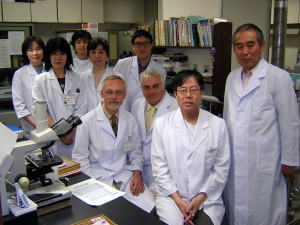Over the Years
Home > Over the Years > Over the Fiscal Years (2000 APR - 2010 MAR) > Belarus: Physician Training Program
Belarus: Physician Training Program
HICARE invited two doctors from the Brest Ministry Endocrinological Health Care Centre for one month of training at the Hiroshima Red Cross & Atomic-bomb Survivors Hospital.
Name and Position:
Stanislav Grygarovich
Director, Brest Ministry Endocrinological Centre
Sivuda Vladimir
Doctor, Mobile Diagnostic Laboratory,
Brest Ministry Endocrinological Centre
Period:
November 18 to December 12, 2005
Training Organization (in order of occurrence):
Hiroshima Red Cross & Atomic-bomb Survivors Hospital
Hiroshima A-bomb Casualty Council
Hiroshima University Research Institute for Radiation Biology and Medicine
Radiation Effects Research Foundation
Takeichi Clinic
Radiation Effects Research Foundation
Other hospitals
Training Course:
Diagnosis of radiation disorders

With training staffs at the Pathology Dept. of the Hiroshima Red Cross & Atomic-bomb Survivors Hospital
Impressions:
Stanislav Grygarovich:
I was particularly impressed by the tracking of patients: from outpatient medical checkups continuing until post treatment procedures, the patients were always supported in a systematic and organized fashion. Additionally, treatment itself was always conducted with periodic observation by a third party.
I was deeply impressed with Dr. Takeichi’s (Director of the Takeichi Clinic) working methods. His medical treatments themselves were exceptional, and the clinic’s technicians and nurses highly proficient. Dr. Takeichi's skills as a thyroid surgeon are equally impressive, and thus, via this training, I had numerous opportunities to observe parathyroid adenoma treatments and operations.
At the Hiroshima Red Cross Hospital, I observed aspiration procedures (fine-needle aspiration cytodiagnosis) conducted by Dr. Fumio Sawano, Chief of f the 5th Department of Medicine (Endocrine-Metabolic Disease Section). The patient’s treatment regimen was decided after having undertaken tests ranging from thorough clinical exams to aspiration procedures.
At the Pathology Department of the hospital, in addition to specimen staining, I studied pathological histology and cytodiagnosis, as well as pathological diagnosis procedures for conditions such as thyroid cancer, autoimmune thyroiditis, and nodular goiter.
Sivuda Vladimir:
HICARE's training program incorporated a number of subjects from various medical fields.
I was particularly interested in the consistent and continuous nature of treatment, the process occurring from initial clinical exams all the way to cytodiagnosis. I feel it important to adopt a similar process in our daily clinical activities (inclusive of the Mobile Diagnostic Laboratory).
I also found the A-bomb Survivor's Medical Examination Training at both the Hiroshima Red Cross & Atomic-bomb Survivors Hospital and the Hiroshima A-bomb Casualty Council quite interesting.
I would like to use this acquired knowledge for my clinical activity in Belarus. I aim to create a database of Chernobyl-radiation victims, a project I believe will contribute to the victims' medical follow-ups and screenings.




